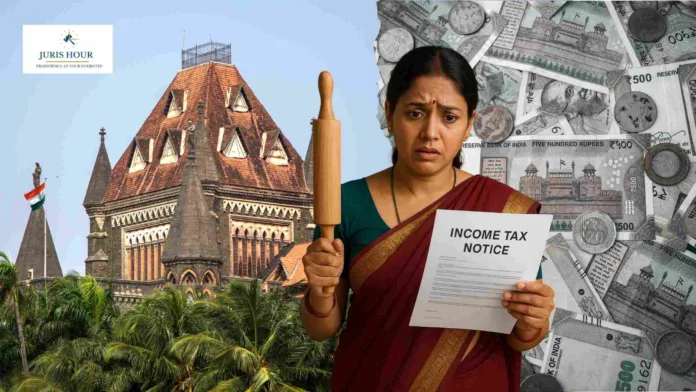The Bombay High Court has quashed a reassessment notice issued by the Income Tax Department against income tax reopening notice to homemaker wife on husband’s property purchase.
The Bench of Justices B.P. Colabawalla and Justice Firdosh P. Pooniwalla held that the notice under Section 148 of the Income Tax Act, 1961, issued on March 31, 2025, was “wholly unsustainable” as the petitioner, a housewife, had not contributed any funds toward the ₹6.75 crore purchase of a flat in Mumbai.
The petitioner/assessee had declared an income of ₹4,36,850 for Assessment Year 2021–22. In June 2024, the tax department issued her a notice under Section 133(6) seeking details of the flat purchase.
The assessee responded that the property was bought solely from her husband’s funds and her name was added as a joint owner merely for convenience. She submitted the registered sale agreement and her husband’s HDFC Bank statements showing payments to the vendor totaling Rs. 6.75 crore.
The assessee stated that she was a house-wife and that the purchase of the immovable property (flat) was done entirely by the Petitioner’s husband from his own funds/sources and not by the Petitioner. The Petitioner submitted that she could not provide any bank statement as well as source of income for purchase of the said flat. In other words, it was the case of the Petitioner that she not having paid any consideration for purchase of the said flat, she was not in position to prove the negative. It was fairly stated by the Petitioner that despite this, her name was added as a joint second owner of the flat purely for the sake of convenience.
Despite this, the assessing officer’s preliminary report claimed her response lacked supporting documents and questioned her husband’s source of funds. The department then proceeded to issue the reassessment notice under Section 148.
The Bench noted that the sale agreement and bank records—produced both before the department and the court—clearly showed the entire consideration came from Shah’s husband. The judges said they “failed to understand” how the officer could conclude that Shah’s income had escaped assessment in such circumstances.
Significantly, a separate Section 148 notice had also been issued to her husband for the same transaction. The court pointed out that the proper course was to examine the husband’s assessment, not the wife’s.
The judges relied on their 2024 decision in Kalpita Arun Lanjekar v. ITO, which dealt with a similar situation where a homemaker’s name was included as a co-owner in a property purchased by her husband. In that case too, the court quashed the notice, holding that the wife’s income could not be said to have escaped assessment when she had made no payments.
The court set aside notice and all consequential proceedings.
Case Details
Case Title: Hetal Vipul Shah Versus Income Tax Officer, Ward 19(1)(5) & Ors.
Case No.: WRIT PETITION (L) NO. 20922 OF 2025
Date: August 4, 2025
Counsel For Petitioner: Sham V. Walve
Counsel For Respondent: Mamta Omle
Read More: From Rs. 20K a Month to Crorepati: Formula

